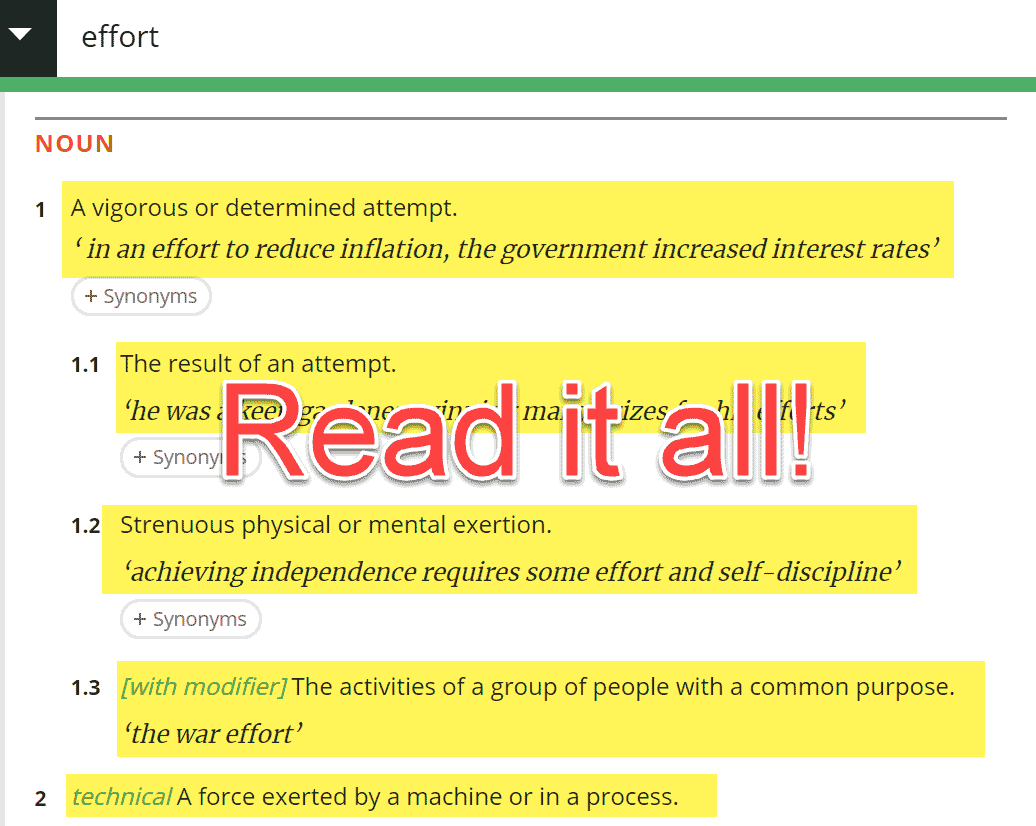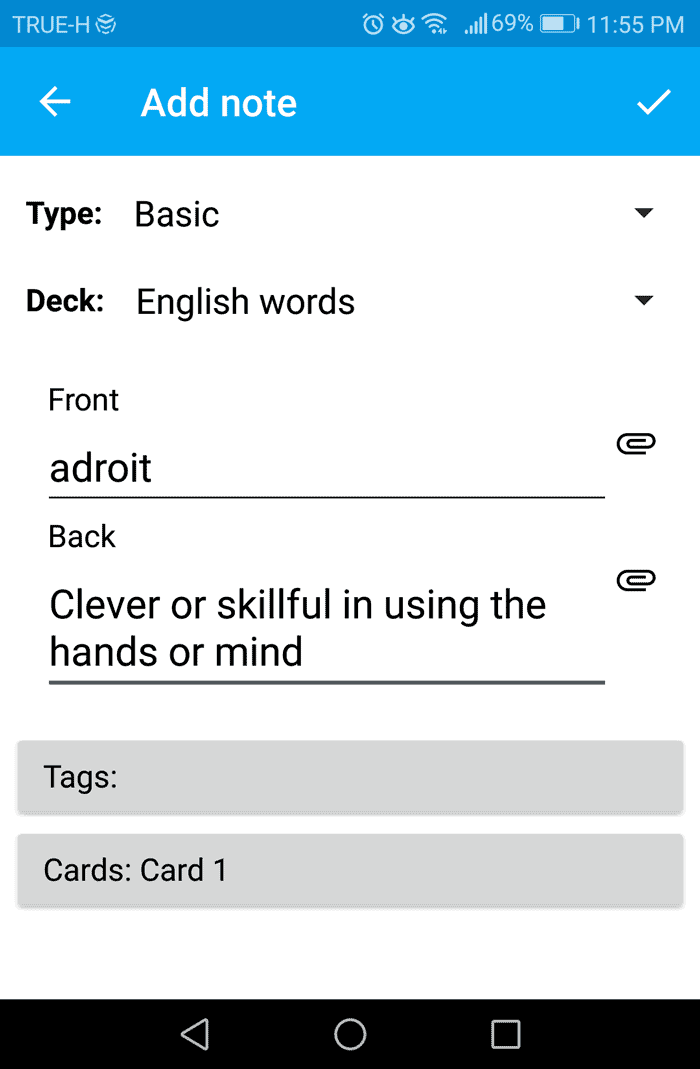
Do you keep forgetting the English words you learn?
Are you tried of looking up the same words in the dictionary repeatedly?
If so, you’ve come to the right place.
This guide will teach you the top 3 techniques to remember vocabulary better.
Here are the techniques:
Let’s dive into each method in detail.
Technique #1: Process Words Deeply

This method is based on the Levels of Processing effect, which states that words that are “processed” more deeply are remembered better.
Most people don’t make an effort to remember words. When looking up a word in the dictionary, they simply read the definition once and move on. This is “shallow” processing and it’s a bad way to remember anything.
So how you can learn a word more deeply?
Well, the first thing you can do is read all the definitions (if it has multiple meanings), as well as the usage examples.

But this is still shallow and doesn’t involve much mental effort.
You can go even deeper.
For example, think about the general meaning of the word. Ask yourself whether the meaning is good, bad, or neutral.

Suppose you’re learning the word effort (a vigorous or determined attempt, physical or mental exertion), how would you categorize this word?
For me, the general meaning of effort gives me a picture of someone trying hard to achieve something, so I categorize it as good.
But for someone else, the word might make them think about someone trying to finish a lot of boring tasks, so they will categorize it as bad.
It doesn’t really matter whether you think a word is good, bad, or neutral. What matters is that this process forces you to think about the word meaning more deeply.
Categorizing words is just one way to memorize words deeply. Another thing you can do is try to think of the word’s synonyms and antonyms (words with similar and opposite meanings).
Or you may create a mental image or a story that signifies the word meaning. For example, if you want to memorize the word forfeit (to lose something as a penalty for wrongdoing), perhaps you can imagine yourself losing a lot of money because you’ve done something against the laws.
The key is to perform some kind of mental exercise that forces you think about the word meaning on a deeper level.
My Thoughts on The Technique
This technique is probably the easiest to do since it can be performed quickly without using anything special like vocabulary software.
The drawback is that it’s probably the least effective method of the three.
The nature of new memories is that they fade quickly if you don’t make an effort to recall them afterwards.
So, even if you try to memorize words deeply, there’s still a chance of forgetting.
That being said, if you want to remember vocabulary a little better and don’t want to use methods that are too complicated or hard to do, this technique is pretty good.
Technique #2: Associate Words with Mental Images

Ever heard of World Memory Championships?
These are competitions in which participants compete by memorizing as much information as possible within a given period of time.
In such events, it’s not difficult to find someone who can memorize the order of 50 random cards within three minutes.
These people are not super humans; they’re able to do what they do through practice and a number of memorization techniques.
Let’s look at one of those techniques: the Association technique.
How to Do The Technique
First, you need to know the pronunciation of the word you’re trying to memorize. Sometimes, you can guess it based on the spelling. If you’re not sure, listen to the pronunciation on a dictionary (or on YouTube).
After that, say or listen to the word over and over. Does it sound like another word (or words) you know? Does it sound like the name of a person? An animal?
The word(s) you think of can be English words or words in your native language. But they should refer to things you can visualize: objects, animals, people, or places.
Let’s say I want to memorize these words:
- Adroit: clever or skillful in using the hands or mind.
- Effort: a vigorous or determined attempt, physical or mental exertion.
- Forfeit: lose something as a penalty for wrongdoing.
Here’s how each of them sound like to me:
- Adroit sounds like android (a human-like robot).
- Effort sounds like F (letter) and Ford (A car manufacturer)
- Forfeit sounds like four (number) and Fed (Fed can refer to either FedEx delivery or Roger Federer).
Once you’ve come up with the substitute word(s), visualize those words in your mind and try to “associate” (link) that mental image to the word meaning.
How do you link the image of an android (our substitute word for adroit) to the meaning “clever or skillful in using the hands or mind?”
Maybe you can imagine the android doing something that requires complex hand movements. Perhaps visualize it playing a guitar solo on stage.

Put some effort into it. Add some details to that mental image. Perhaps imagine the android using a few advanced guitar techniques such as speed picking, sweeping, and tapping.
And that’s it. The next time you see or hear the word adroit, it will remind you of an android, then you’ll think about that silly mental image, and you’ll remember the word meaning!
Let’s do one more example: forfeit (sounds like four and Fed).
How do you associate four and Fed with the meaning “lose something as a penalty for wrongdoing?”
Perhaps we can imagine that Roger Federer has three siblings (so there are “four Feds”). They love each others very much. Then one day during a tennis match Roger Federer misses the ball completely. He gets so mad at himself for making such a stupid mistake and throws his racket on the ground.
Because of this inappropriate action, the tennis association decides to put his three siblings in prison. So Roger Federer loses the three people he loves because of his wrongdoing.
Now, put a real effort into visualizing this story.
Concentrate….really…really…hard.
It won’t work if you just do it casually.
And you’re done! The next time you encounter the word forfeit, you’ll think of four Feds, you’ll think of this silly story, and you’ll remember the meaning.
My Thoughts on The Technique
With some practice, this technique can be powerful.
If the association you create is strong enough, it’s possible to remember a word forever, without any repetition.
It works because of various reasons:
- We tend to remember images and stories better than words and meanings.
- It makes you pay attention to the pronunciation and meaning.
- Information is better remembered if it’s created by yourself (the generation effect).
A minor issue I have with this technique is that you have to know the pronunciation.
Although there are plenty of online dictionaries with audio pronunciations, it can be annoying in some situations like when you’re in a library or classroom and don’t have earbuds.
And as you can see, it take some effort, time, and creativity to come up with substitute words and mental images. (But this will gets easier with practice.)
Overall, this is a very effective technique. It’s fun to do and doesn’t require any special tool. (Personally, I like this one the best.)
If so, enter your email address to join my English speaking course:
Technique #3: Review Words at Spaced Intervals

In 1885, a German psychologist did a number of experiments on memory.
The experiments involved memorizing lists of nonsense syllables such as DAX, BOK, and YAT.
In one experiment, he memorize two lists in two different ways:
- He repeated the first list 36 times in a single day.
- He repeated the second list 12 times a day for three days (so the total number of repetitions is 12 X 3 = 36, the same as the first list).
Later he recalled the two lists and found that recall of the second list was substantially better.
What does this mean?
It means you remember better when repetitions are “spaced out.”
So instead of memorizing a particular word many times within the same day, you may do it over a span of days or weeks like this:
- First repetition: 1 day
- Second repetition: 7 days
- Third repetition: 16 days
- Fourth repetition: 35 days
This spaced repetition strategy allows you to remember better, with fewer repetitions.
The reason why this works is a highly debated discussion among researchers. Some theorized that when you recall information this way, it signals your brain that the information is important and should be stored long term.
Practical Application
How do you apply spaced repetition to your vocabulary learning?
It’s relatively simple. Many vocabulary/memory apps have spaced repetition integrated into their software, so you don’t have to figure out when to repeat certain words, the app will take care of that for you.
A popular spaced repetition app is Anki. When you want to memorize a word, you create a flashcard (it’s a card with the target word on one side and the meaning on the other).

After you’ve entered a good number of words into Anki, you can start reviewing them. If you get a word wrong, the app will show the same word again soon. If you get a word right, you won’t see the word for a while.

You can watch this video to see how it works:
My Thoughts on The Technique
Generally speaking, the more complex a memory technique, the more costly it is to use.
Although this spaced repetition technique is effective, it comes with a price.
The price is that you have to keep adding new words into the app. And you have to spend time reviewing them. This can be a hassle for some people (myself included).
However, if you want to remember every word without fail and don’t mind a little bit of complexity, this is the technique for you.
If you’re not sure, you can give it a try. If it turns out to be too much for you, you can resort to the first two techniques.
Final Thoughts: How to Remember English Vocabulary
You have learned three best methods for remembering words in English (or any other language).
Now is the time for you to pick a method (or methods) to use.
All these methods have been scientifically proven and tested. You can use one, two, or even all three depending on how sophisticated you want your approach to be:
- A more sophisticated approach is more effective but less convenient and more time consuming.
- A simpler approach is less effective but easy to do (an extreme example is not trying to remember vocabulary at all)
Whatever approach you come up with, please be reminded that English vocabulary is only one aspect of your English competency. Don’t be obsessed with it too much and forget to improve other things like grammar, comprehension, speaking and writing skills.
So if you want to focus on the big picture as well, check out my guide on how to learn English.

